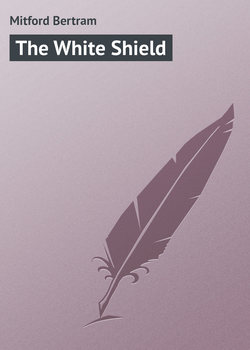Читать книгу The White Shield - Mitford Bertram - Страница 1
Prologue
ОглавлениеWe were talking about Rorke’s Drift and of Kambúla, in the battles fought at which places these two warriors had borne arms. They were fine, tall, martial-looking Zulus, and both head-ringed. They carried small shields, and a perfect arsenal of assegais – beautifully-made weapons for the most part. With none of these, however, could they be induced to part.
“What should you white people want with our poor weapons?” said one. “Have you not much better ones of your own? Where is your gun, Umlúngu?”
“Yonder,” I answered, pointing to my wagon, which, far away on the plain beneath, drawn by its span of twelve black Zulu oxen, seemed at that distance to creep along like some great centipede. “But I seldom carry it about, for there is little game in these parts, and a useless gun is much heavier than a stick.”
“And a Zulu spear is no heavier than a stick, but more useful,” cut in the other, with a quizzical laugh.
Then it took some time to explain that the weapon was wanted, not for use, but for show – in short, as a curio – in process of which explanation a voice from behind sang out —
“Au! Nkose1 is fond of assegais!”
I knew that voice. Turning, I beheld the tall, gaunt form and sinewy limbs, the white-bearded countenance and bright eyes of old Untúswa, some time induna under the great Umzilikazi, Founder and first King of the Matabeli nation.
“Greeting, old friend!” I said, as he plunged eagerly forward to bestow upon me a hearty handgrip; which, by the way, left a sensation as of having shaken hands with a remarkably energetic skeleton. “Greeting to you, son of Ntelani, induna of the Elephant who of late trumpeted in the North! Greeting also to the King’s Assegai!”
“You are my father, Nkose!” cried the old man, sinking down into a sitting posture in our midst. “Yes, the King’s Assegai is still alive, like its old owner,” he said, exhibiting the splendid spear, and balancing it lovingly in his hands. “When I saw yonder wagon and the black oxen which draw it, I said to myself – ‘There goes the white man to whom I told that tale.’”
“True, Untúswa, and a right stirring tale it was. But I seem to remember, that when we parted on the Entonjaneni heights, the word was that other matters, at least as strange, remained to be told, should we behold each other again. And here now we do behold each other again, and the day is yet young. Further, here is good store of tobacco, and if there is anything which constitutes a better accompaniment to a story, why, I never heard of it.”
The eyes of old Untúswa brightened as he received the much-prized gwai, holding out both hands for it, as the courteous custom of this people is, even though the gift be no weightier than a threepenny-piece. For to receive anything with one hand only, would, to the minds of these “barbarians,” imply a contempt alike for the gift and for the giver.
High up on the ill-omened Hlobane Mountain we were seated, whose savage fastnesses I had spent days in exploring. It was early morning, and the weather was grey and depressing, seeming to threaten rain. Beneath lay a great panorama of desolate rolling plain and craggy spurs – treeless, forbidding – with here and there a kraal, dotted at intervals, symmetrical in its circular ring-fences. But here, where we sat, poised high above the world, I had come upon another small kraal, and, turning my pony loose to graze, had, as usual, tarried to make friends with its people.
Now, the older of the two warriors with whom I had been in converse, called aloud, and presently there appeared a couple of stalwart, shapely-limbed damsels, bearing a very large earthen bowl brimming with tywala, or corn-beer, and a basket containing roasted mealies. A goodly portion of the liquor was poured into a smaller bowl and handed to me, after the preliminary sip required by Zulu etiquette, the others taking draughts in common from the large earthen pot.
Zulus, like most uncivilised races, are extremely fond of listening to stories, and hold a good narrator in high repute; therefore, these two sat with faces all animation and heads bent eagerly forward. Then, having taken several copious pinches of snuff, old Untúswa commenced the tale which follows.
1
Nkose means “the chief”, and is a term of courtesy.
